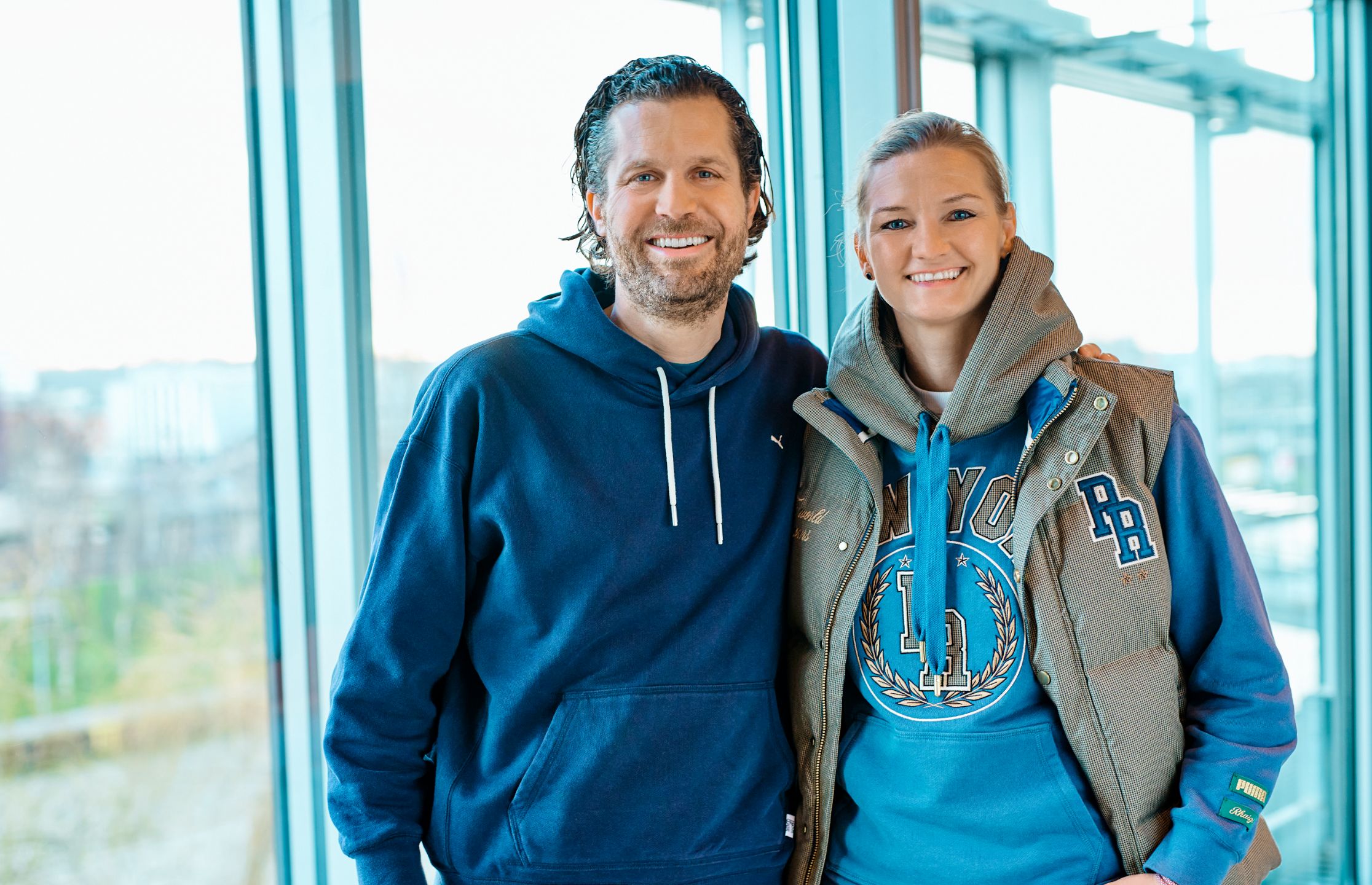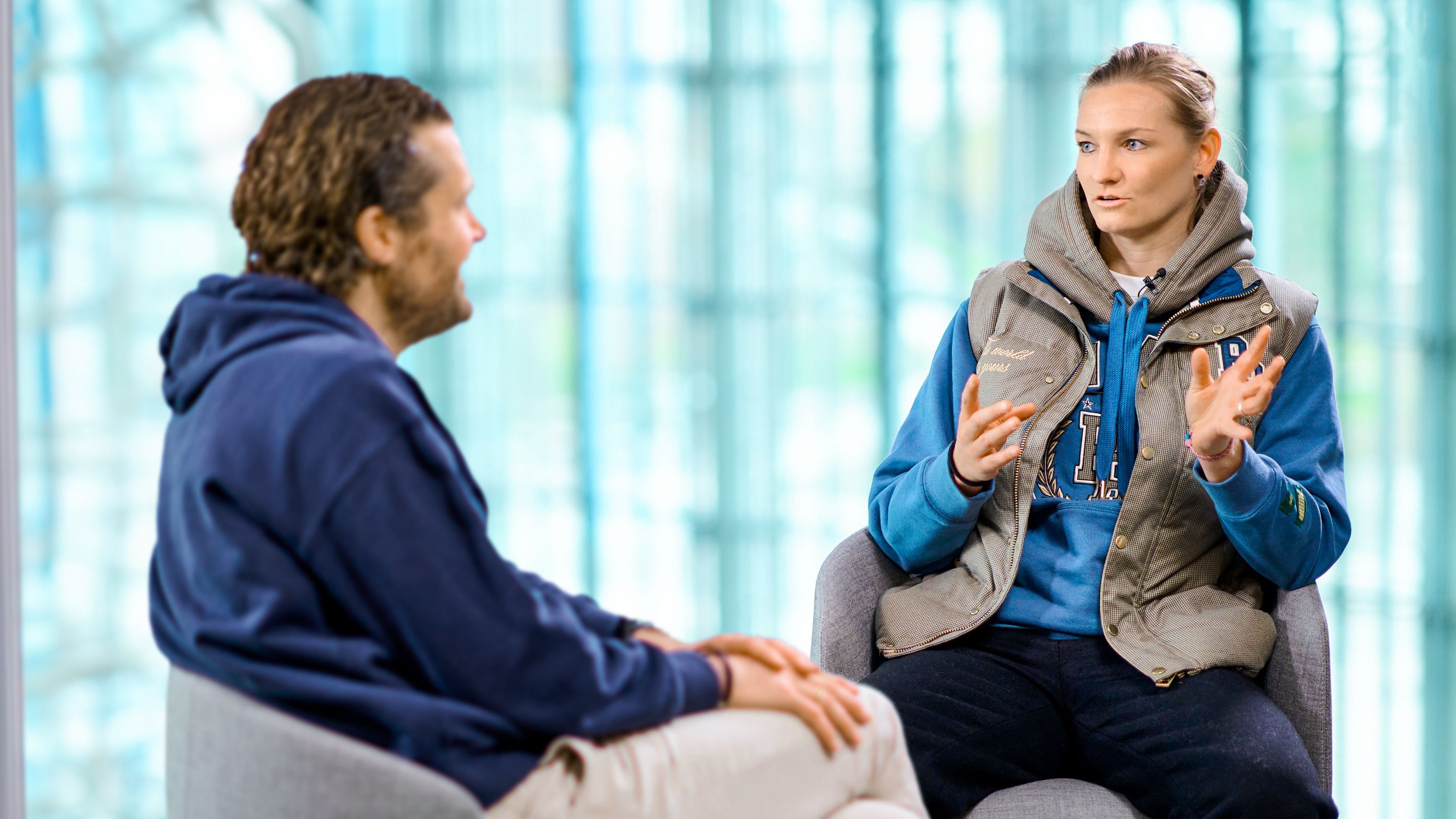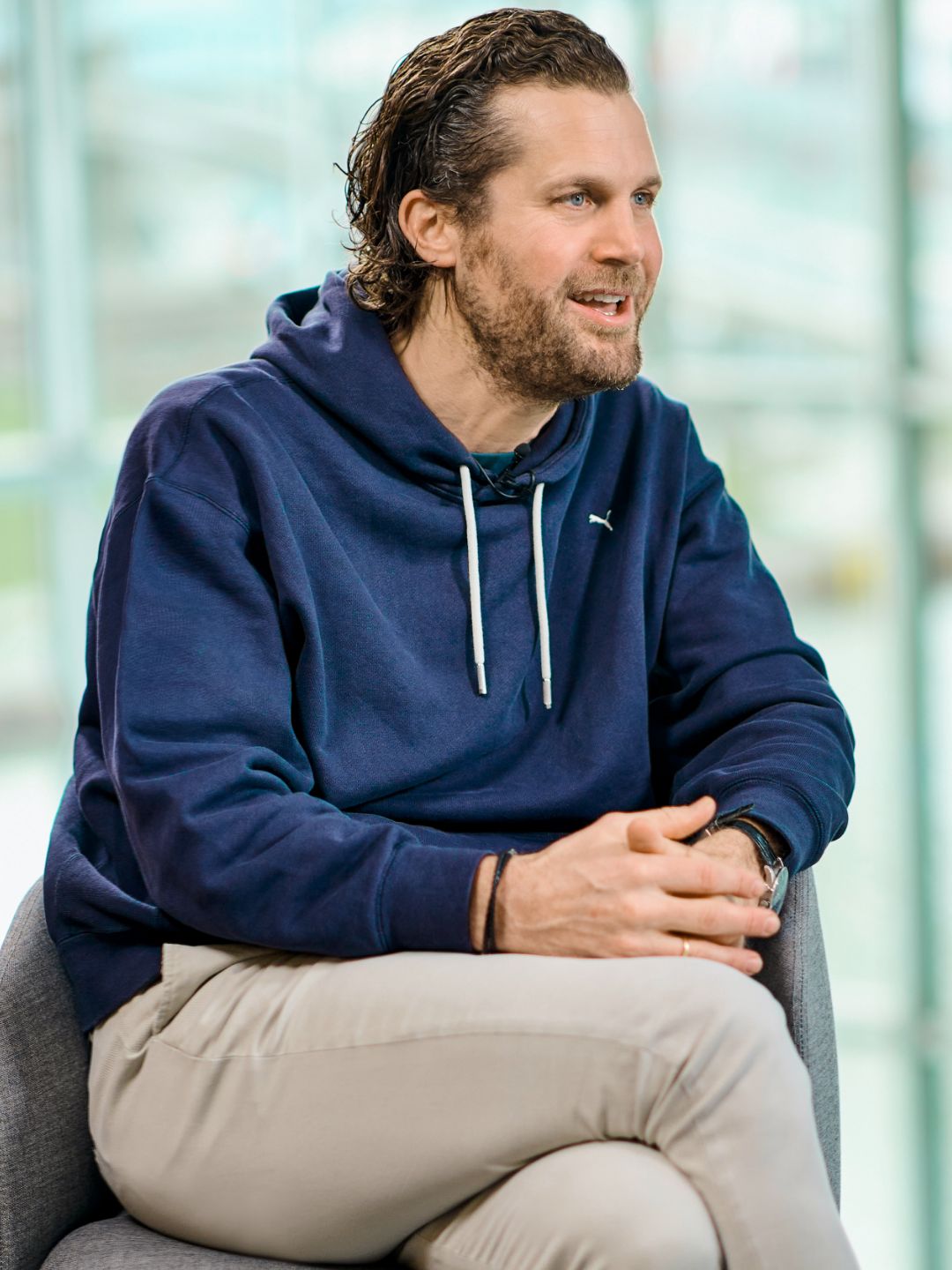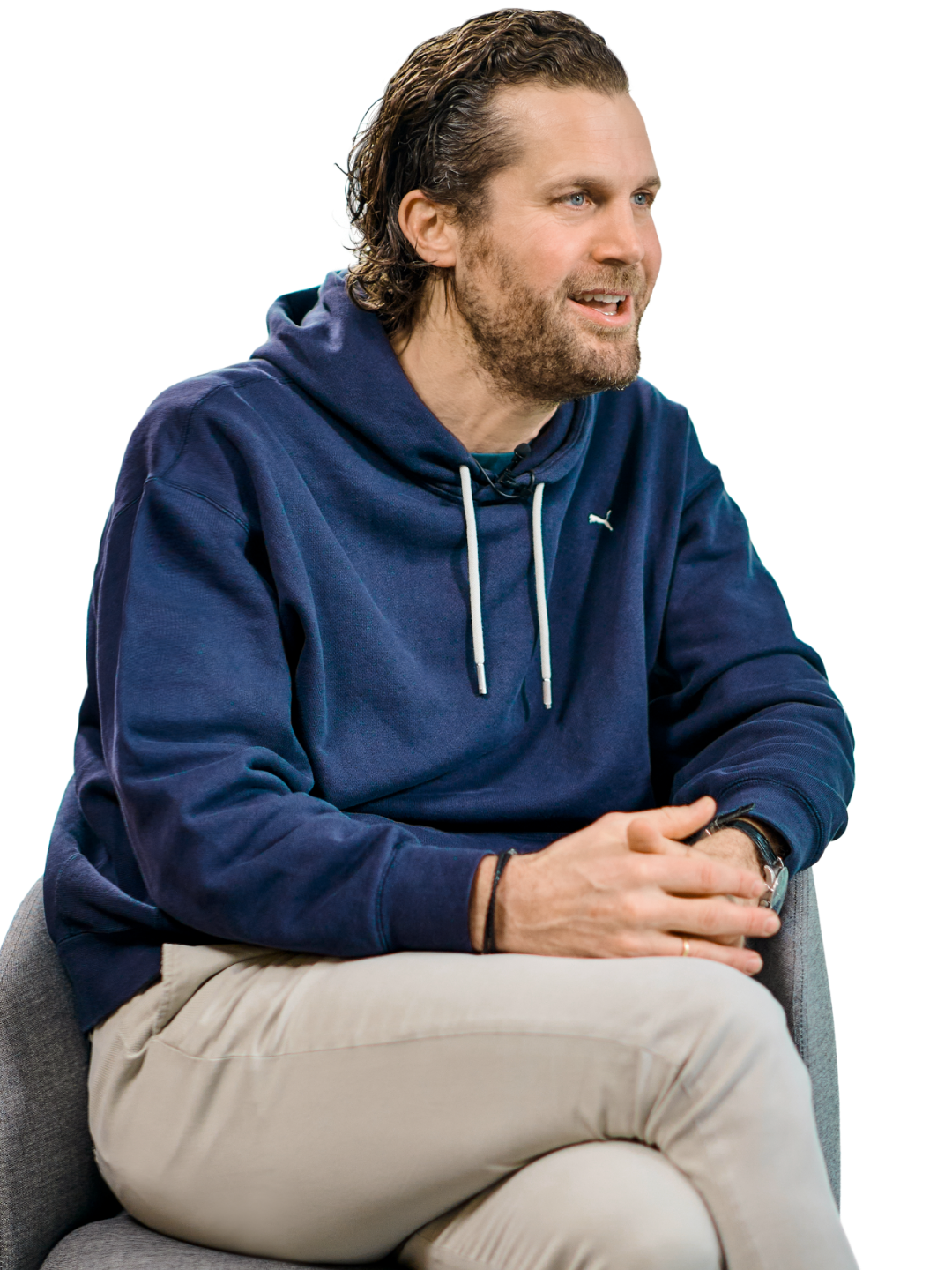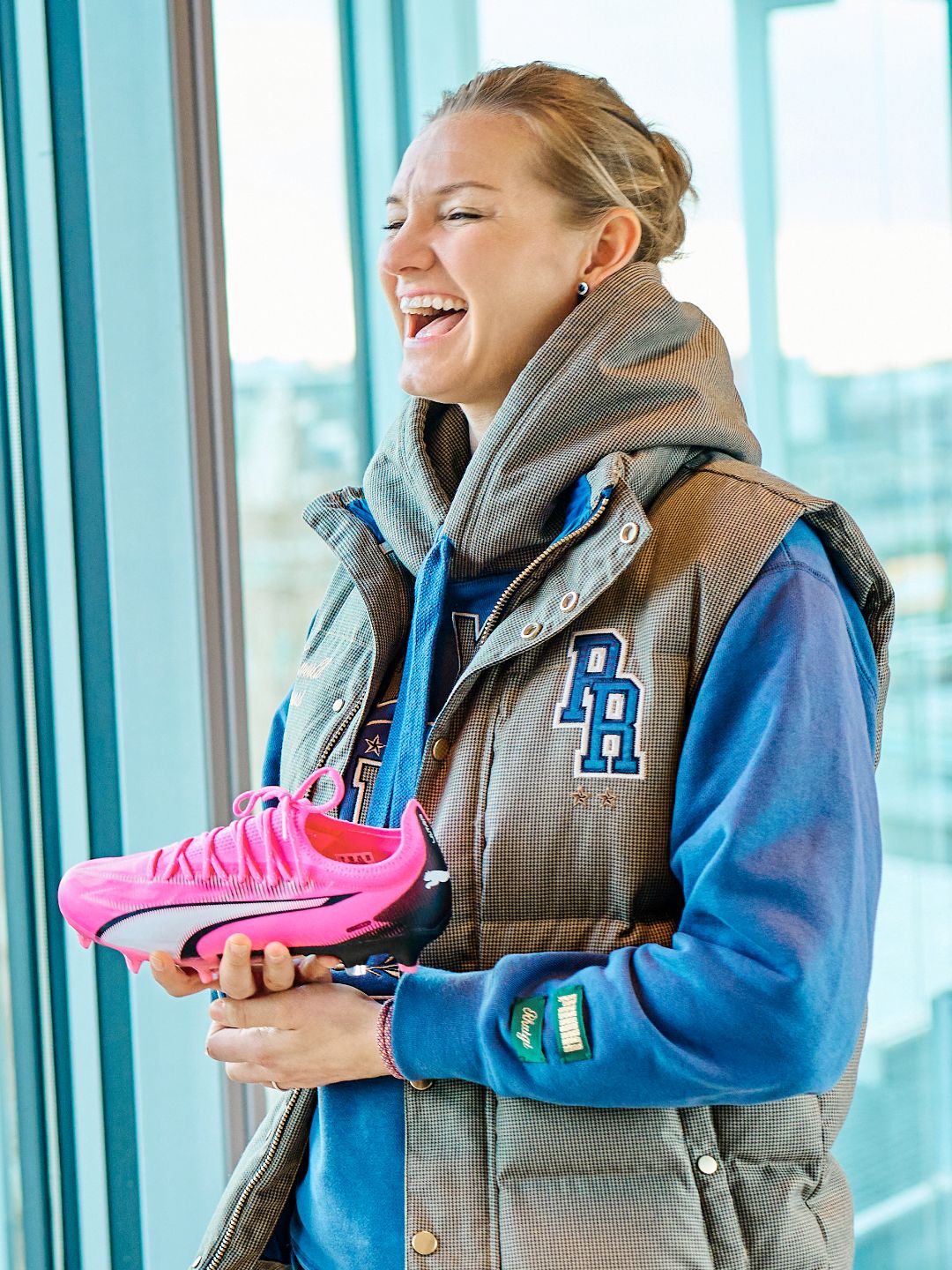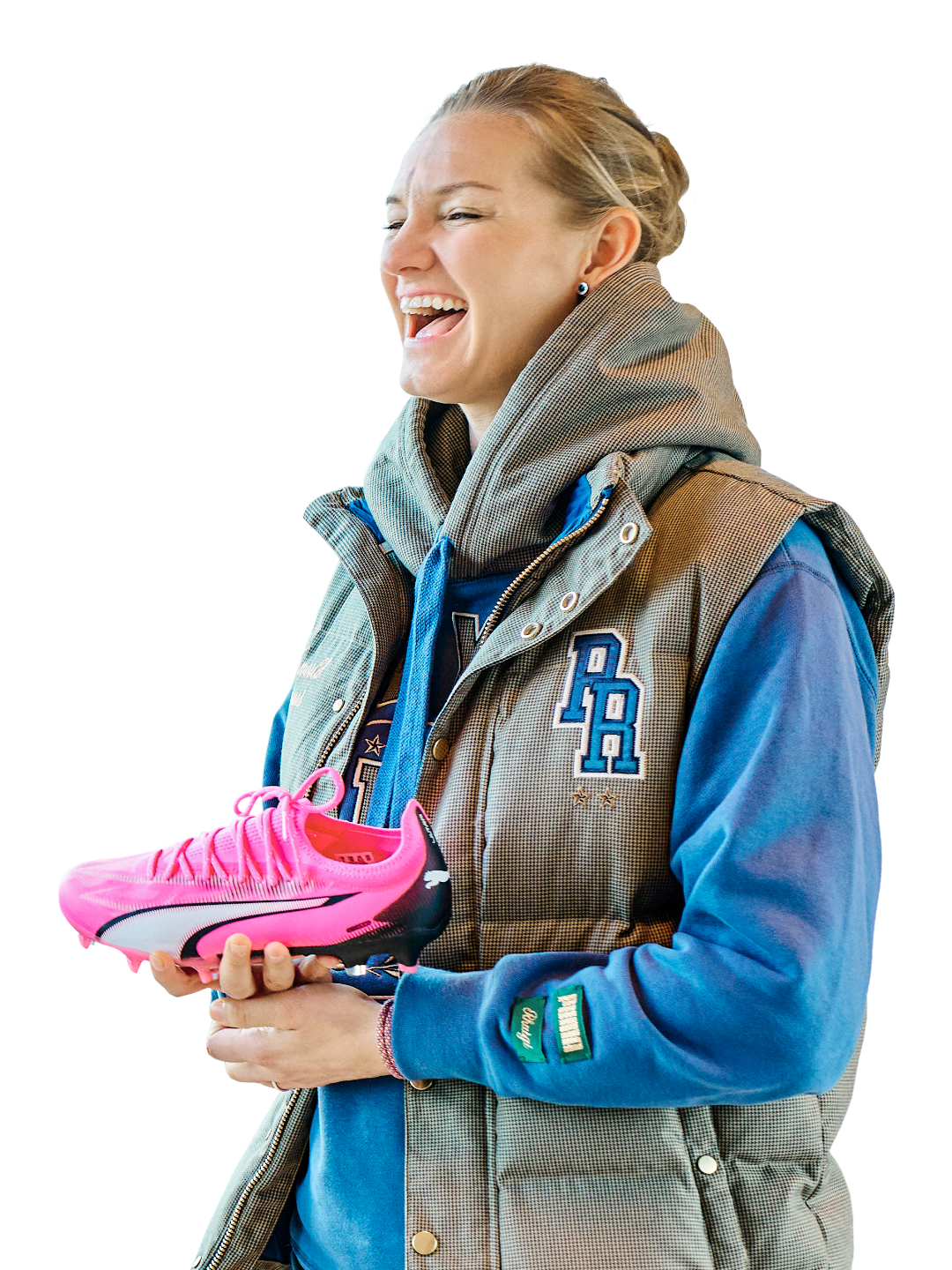PUMA Family Talk | PUMA CEO Arne Freundt and professional footballer Alexandra Popp
“Sadly, not much has changed for girls in football.”
To kick off the 2024 PUMA Year of Sport, PUMA’s CEO Arne Freundt met with Alexandra Popp, captain of the German National Football Team, in Wolfsburg to talk about leadership within the company and football, teamplay, and motivation.
Alex, you’ve been quoted as saying that you make the German National Team feel safe on the pitch. Is that your role as captain?
Alex: I think it is part of my role, but not the only part. Leading the team, sharing the will to score, and giving my teammates on the pitch the feeling that we will win – all that is my responsibility. Also, to some extent I am the link between the coaches and the players that makes everything work smoothly.
Arne, how does that apply to leadership within a company? In your opinion, is leadership synonymous with making your teammates feel safe?
Arne: I think at PUMA we wouldn’t use the word “safe”, but rather trust. By that I mean the trust that we as leaders show our staff members: trust in their capabilities and in their decision-making. I believe that an environment of trust creates safety and makes people feel supported and empowered to make decisions. For me, trust and safety are closely connected.
Alex, how do you communicate with your team before an important match? What do you typically say?
Alex: That varies because I have to get a feel for the team in each specific situation. What makes them tick in this very moment? Sometimes I have a good feeling from the get-go when the players come onto the field with a good attitude. At other times, I notice during our training sessions leading up to the match that nothing will happen on the pitch, that my team might need a little kick. That kick can look very different at different times. It is mostly about building up confidence, encouraging, bringing each of their strengths to the field, and linking each player with the fabric. Then again, it is also about letting them know you trust them.
Arne: We have this interrelationship at PUMA as well. You have to put in the work at training sessions and you may need to increase the pressure, but immediately before an important meeting you have to decrease the pressure and make sure the people have the freedom to work it out for themselves. You have to give them the amount of trust they need to give their all – without overcomplicating things.
Arne, what is the equivalent of a pre-match prep talk in the business world? What do you say to your team members to get them to give their best?
Arne: We don’t have such pre-match prep talks. We always aspire to keep making the company better. I’d say that every day is match day. But, of course, there are also some extremely important meetings and every one of us simply has to perform at his/her best. What is important is intensive preparation and talking to the team to strengthen their self-esteem: We have what we need, we will succeed, now go out there and have fun. It’s about the right balance between enjoying the moment and taking off the pressure and getting into the flow.
Alex, why did you decide to take on the role of captain? Did you choose leadership or did leadership choose you?
Alex: I believe you can’t choose leadership as such. To some extent, it is given to you. There are many female players who can’t be pressured into taking on leadership roles – either you have it in you or you don’t. I had it in me before I became captain, simply because of the mentality I built up in my youth. When I was asked if I could see myself as captain, I checked in with myself to see if I had the confidence and if I was able to gauge all that lay ahead of me. So, I guess I have to say leadership chose me. Especially at the national level, it is a huge honour for me to lead my team.
Arne: Was there anything you hadn’t anticipated?
Alex: Not really. It took me a year to truly grow into the role, especially in terms of communication. How can I talk, and to whom? How do I lead on the pitch? Being talked to clearly and harshly has always helped me, so I thought I should do the same – but that went sideways with some of my teammates. That was something I had to learn.
And there were some moments that weren’t easy. Women’s football has become increasingly visible and popular because of our success at the European Championship. Then we crashed at last year’s World Championship, and it was me who took the fall. Afterwards, I took three months off. I really needed that break.
Arne, you already have a long and successful career behind you. At what point did you decide to lead large teams?
Arne: I am with Alex, and I also believe it is not a decision but an evolution. My first team was relatively small with just two members, but even then, I enjoyed advising them, helping them develop, and watching them get better in their jobs. Holding a mirror up to people also helps with their personal development. I have always relished that. My team grew then with my responsibilities. Managing and working with people is still my favorite thing at work.
Alex, as captain you have to react quickly to changes or difficult situations in a game, mostly when your team is behind or isn’t playing the way it should. How do you motivate your teammates to fight for victory?
Alex: Every one of my teammates has basically the will to win – but it depends on how the match is going. Even if you are 1:0 behind, you may have dominated the game, but just failed to score that goal. In this case, I let my team members know we still are 100 percent in the game, we have full control over the opposing team, and we only have to score the goal. However, there are matches where you think to yourself, even if we were to keep playing for five hours, we would not succeed today. In these situations, you need to stand up and raise your voice a bit so the team wakes up a little.
Arne: We also have defeats or setbacks, of course. In your case, if the opposing team scores a goal, you only have seconds to get it right. We at least have time to reflect on what went wrong and what we will do better the next time. But I agree that reflecting on the past for too long is wasted time; it gets you nowhere. That also applies in the business world.
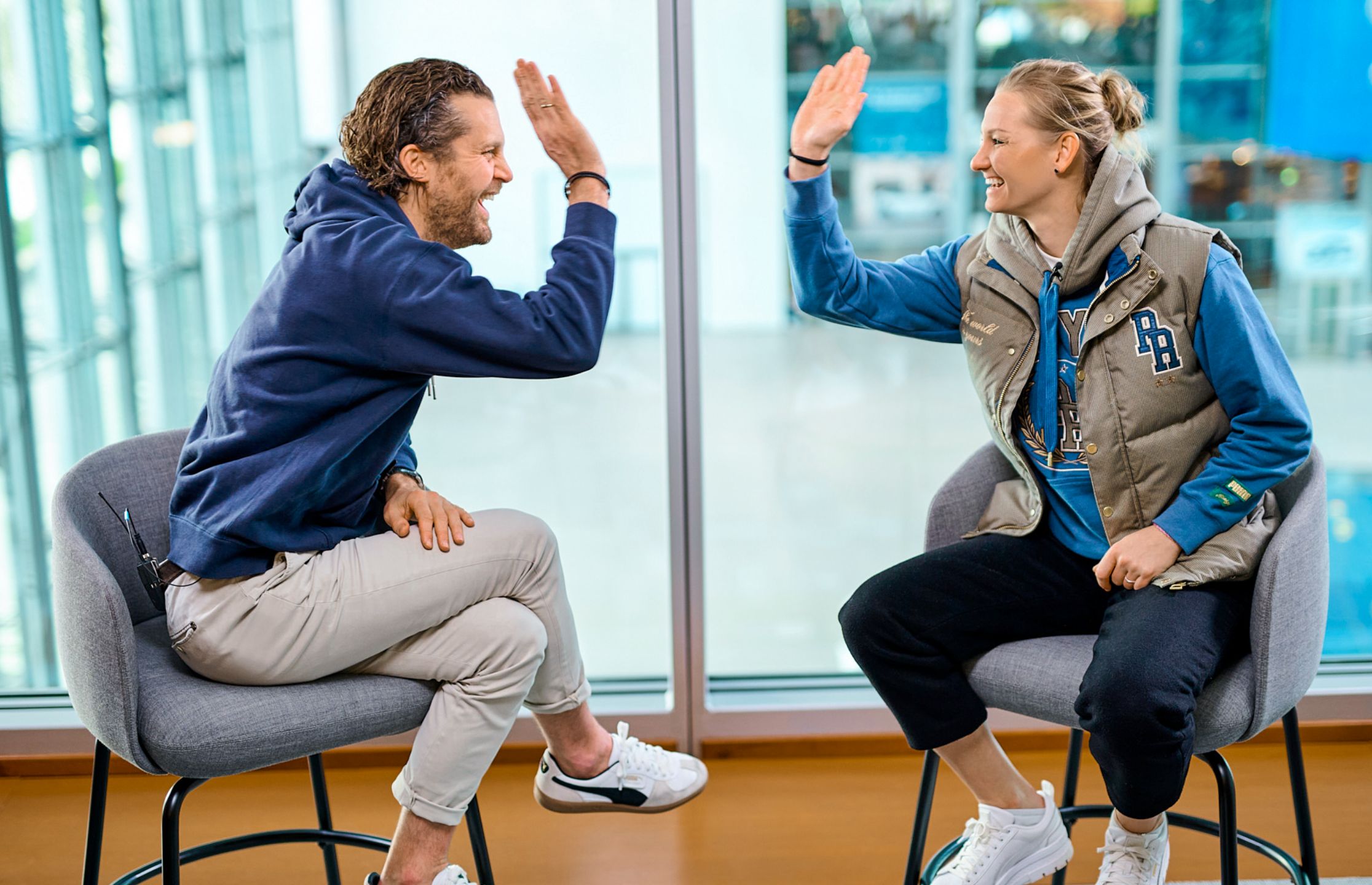
Alex, this year the German National Team will play in the Olympic Games. Given the difficult year you have had, how will you prepare your team to perform at the highest level?
Alex: Every player is responsible for preparing as well as possible for matches or for the Olympic Games. Our coaches have already started to create a certain mindset within the team, so maybe there won’t be that much left for me to do. Otherwise, of course, all I can bring to the table are my own experiences. The Olympic Games are nothing like the European or the World Championships. The Olympic spirit really gets you. You not only show up as a team, but as the big Team Germany. Being lucky enough to play in packed stadiums and maybe even take home the gold medal, that is motivation enough.
Arne, you said 2023 was a year of transition for PUMA as well. How have you prepared the company for the 2024 PUMA Year of Sport with the Olympic Games, Euro 2024, and the Copa America?
Arne: Yes, 2023 was a transitional year for us and for the entire industry. We were just getting out of the pandemic which had resulted in soaring growth rates for us all. Although we did experience a strong growth last year, we no longer saw two-digit rates. At least we grew more quickly than our competitors, and that is what counts.
Naturally, 2024 will be the same for us and for you. Having the European Football Championship in your country, the Olympic Games next door in France, and the Copa America in the United States is a dream come true for every sporting goods brand. And we must not forget the European Handball Championships in Germany. That is motivation enough.
It is a very important year for us because we want to show we are FOREVER. FASTER. We are launching a new brand campaign in April that will highlight our superpower – speed. FOREVER. FASTER. means speed, and we will let everybody know that.
Alex, you have achieved a lot in your career. What advice would you give girls who want to follow in your footsteps?
Alex: Girls in football still have it pretty tough. I played football with boys for a long time; that was really helpful. But hearing what people in football clubs say about how boys behave towards girls tells me that very little has changed. I wish it wasn’t so. Still, I would tell girls not to switch to an all-girls team too early, but to keep putting their elbows out. To be able to do that, they need support from their families and ideally their coaches. Having fun is also very important, it is the glue that holds everything together. If you aren’t having fun, you won’t be able to perform well.
Arne: Are you saying you experienced resistance as a kid and as a teenager when you wanted to play on boys’ teams?
Alex: The boys on my team were okay, my problem was our opponents. You get made fun of a lot. “Oh look, we are playing against girls, that makes it easy for us.” Things like that. Or when you dribble past one guy and then the next and the third one knocks you off your feet – very poor sportsmanship – and you see his parents cheering him on. Situations like that are not easy when you are a young girl. I had pretty good self-esteem even as a kid and my parents and my coach had my back at all times.
Arne: That’s tough. But this makes players very resilient, don’t you think?
Alex: Absolutely. On the other hand, I understand when a girl gives up. I developed thicker skin and was able to build up a certain mentality. Maybe this is why I have the character I have and am the player I am.
Arne: You are a role model for a lot of girls, and you can say to them, you can do it too!
Alex: Totally!
Arne, how about you? Do you have any tips for young professionals who want to become CEOs?
Arne: My first piece of advice is to think about whether this is the right goal. I think you first need to figure out what you like to do – what your passion is. Pick a field you truly like, where your intrinsic motivation leads you, a field that energizes you. Once you’ve found it, nothing can keep you from becoming successful. If becoming a CEO is your top goal, you will get there. But first, think about what you want to be doing every day. Have fun and follow your passion. That’s how you will get ahead.
